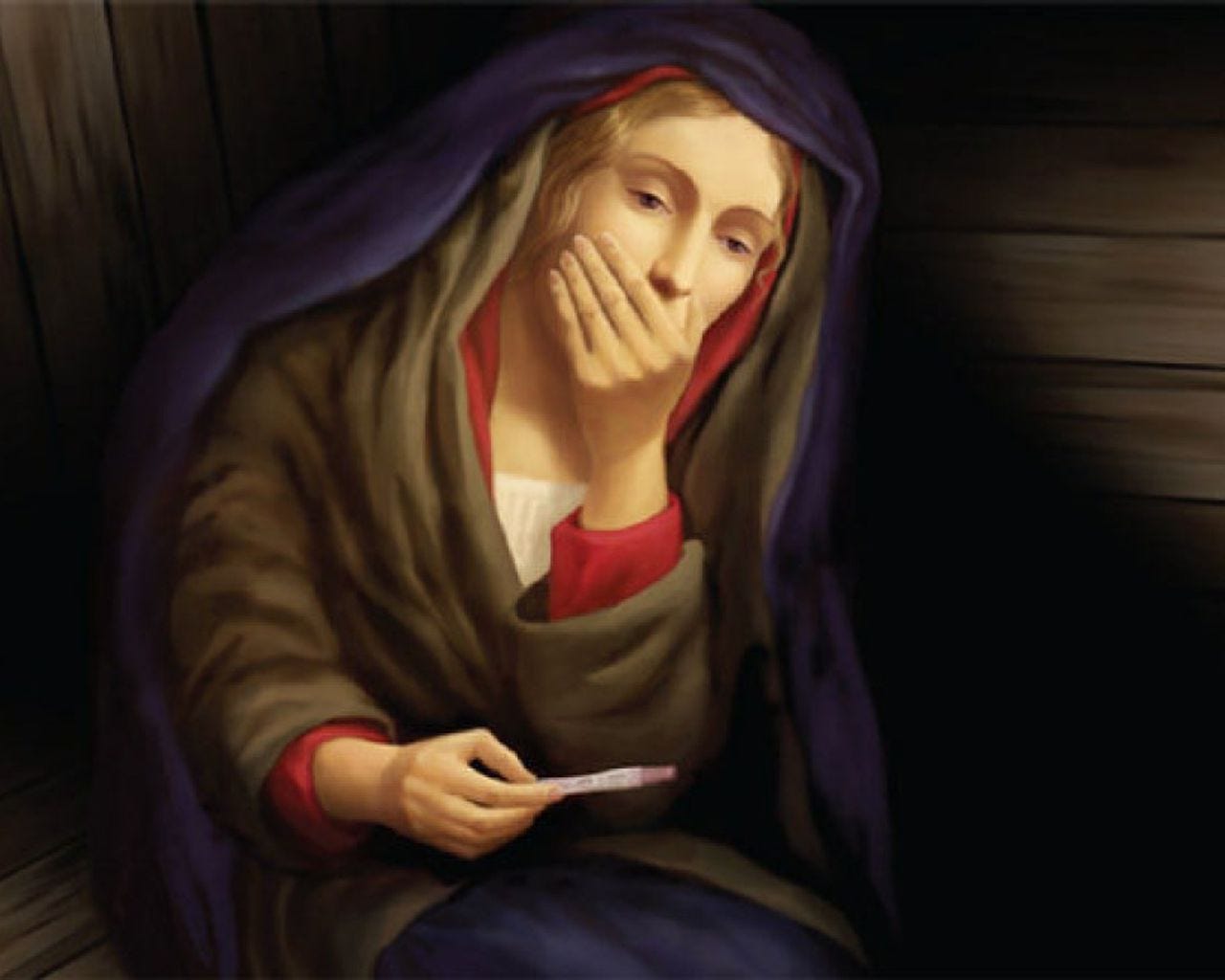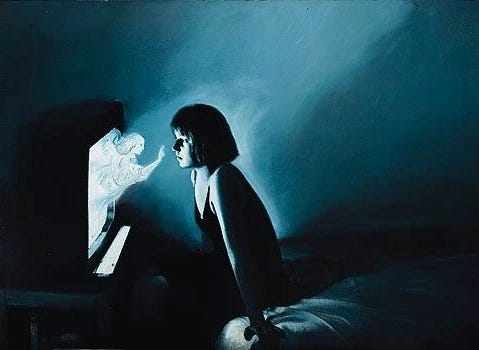When I got pregnant, I promised myself I wasn’t going to be one of those women who writes about motherhood all the time. But the truth is, motherhood provides a lot of fodder for the pen. From the moment I discovered I was growing another living thing inside of me—a tiny vampire, if you will—I had things to say about it. The night I squatted over my toilet and peed on the stick and it came back with the word “Pregnant,” my body became someone else’s. I was a vessel.
Maybe it’s the theologian in me, all those years I spent in Divinity School studying process theology and the way the Divine interacts with our stories and our bodies. Maybe it’s the deep connection I’ve always felt to Mary, the Mother of God. There is a verse in the book of Luke, Chapter two, “But Mary treasured all of these words and pondered them in her heart.” It is part of the Christmas story. The shepherds have just been told by the angels that the Messiah has been born in Bethlehem. They travel to see the baby and when they get there, they tell Mary and Joseph what the angels told them. That this child is special. That he is going to be a savior, the Messiah.
I imagine Mary already suspected something was up. After all, an angel told her she was pregnant with God’s child. You don’t carry God’s child and not expect it to do great things. But on a human level, she’d just given birth and unless God somehow intervened to magically make it painless, it was probably fucking rough. Imagine, no epidural, laying on a pile of hay in a barn, surrounded by smelly animals. I gave birth in a hospital room with all the drugs I could want and I was still in terrible shape. Even if the shepherds arrived weeks later, she was likely still recovering. She was also forming those first fierce bonds with her baby. Child of God or not, she had carried him, given him her body for nine months. Shared with him her blood, her every meal, her every nutrient. When strangers walk into your barn and tell you your kid is going to be the Messiah, you take stock of that. You look at that little wrinkled creature in your arms, so vulnerable and helpless and you wonder how he will ever become such a thing. And you wonder if you want him to become such a thing, because it means you will lose him. Mary was only human and I can imagine that what Luke meant when he told us Mary pondered these things in her heart, was that she worried for her son, her baby. Her own flesh.
I tell you this story of Mary, because even before becoming a mother, I identified with that verse in Luke. So much so that I tattooed Mary onto my left arm. She was an observer of all she saw around her. I am much the same way. But when I got pregnant, I identified with Mary on a whole new level.
Not to say I was carrying the child of God, my kid is great, but he is certainly not divine. I identified with her as a vessel. In the Christian tradition, we don’t talk about Mary as a person. Maybe during the Annunciation some pastors will mention that she was just a regular girl, but it’s passing. Mary is never anything except the vessel that carries the Christ. That births (according to Christians) the savior of the world. After that, we’re done with her, the story is all about Christ. But that has never sat right with me. What about her, I’ve always wondered. How did she feel watching his story unfold?
There is a gospel that doesn’t appear in the Bible, nor does it appear in the apocrypha. Many scholars, throughout history, have forsaken it for heresy. It’s The Gospel of Thomas, or the Infancy Gospel. It’s Jesus’ childhood, his life as a boy trying to figure out how to use this gift he has been blessed (or cursed?) with. At one point in the story, he makes birds out of clay and then breathes life into them, a beautiful image. But later, he strikes his neighbor’s blind. As you would assume, they complain to his parents. The gospel is about Jesus learning to be Jesus. And when I read it, I often think about Mary in a very human way. As a mom who had to figure out how to punish her child. How to toe the line so that he could grow up to be what God had said he was going to be. It doesn’t seem like an easy task, and she doesn’t get enough credit.
The end of my pregnancy culminated with Lent in 2020. The season of the church right before Easter. Holy Week, the days leading up to Christ’s death on the cross, is where we get the celebration of communion. Christ and his apostles gathered in an upper room and Christ said those words that all Christians know, and maybe even some nonchristians too. At the supper Jesus took bread and said, “Take and eat, this is my body, broken for you.” Then he took a cup of wine, saying, “Drink from it all of you, for this is my blood poured out for you.”
This is my body, broken for you.
This is my blood, poured out for you.
These words rang in my head over and over again throughout my pregnancy.
This is my body. This is my body. This is my body.
Take it.
Take it.
Take it.
Did Christ know while he said these words to his followers, that his mother must have felt the same way? That thirty some years before she lay on the floor of a barn, spilling her own blood for him?
It’s coming up on Easter now, two years after I gave my own body, my own blood, in order to bring my own child into the world. These words feel no less relevant. This is MY BODY, broken for my child. This is MY BLOOD, poured out for my child.
Lent will never look or feel the same to me. I’ll always remember the chaos and pain and brokenness of those days. Real and tangible now, not just a story on a page.
Divinity school was such a long time ago for me. I don’t use my theological education in the way that I thought I would. But it informs the way I write, the way I see the world, and the way I mother. And it informs what I think of as divine. The story of Christ in the Bible is just one story. Behind him there is a mother and I find her story much more compelling. She gave up her body and in the end, gave up her baby.






Julia, that was absolutely fucking beautiful. You know me through church as a child and teen, but I no longer identify as a Christian much for the same reasons you wrote about. What about Mary's story? When I had my own 2 children I realized how much our culture follows what you wrote about - the mother as vessel. Once the child is born, it's all about the baby. Maybe if we knew more about Mary and her story and her struggles our culture would put more emphasis on mother's wellness and treat the child and mother as a whole unit.